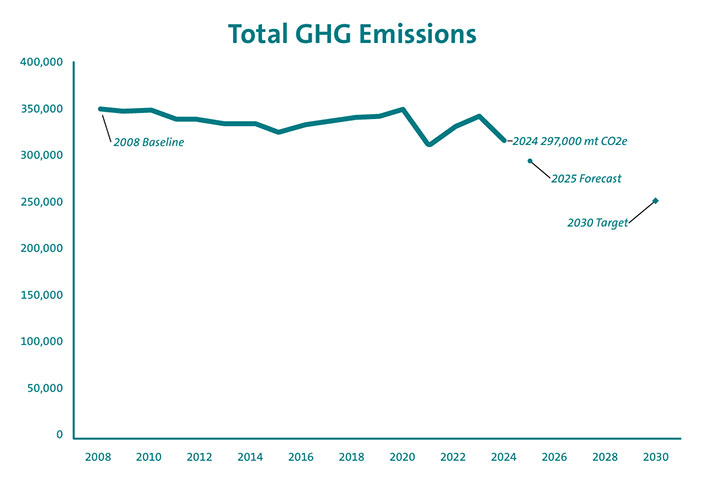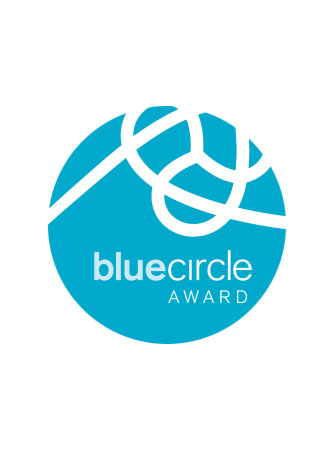In delivering one of the largest ferry services in the world, we are focused on operating responsibly and reducing the impact of our operations on the environment. Our commitment to the environment is centered on three areas:
Climate change
Reducing our carbon footprint and meeting the CleanBC 2030 targets for the transportation sector, through reduction of 2008 greenhouse gas emission levels by at least 27% by 2030. We’re doing this through:
- Transition to non-fossil fuels and using available biofuels
- Electrification of two routes by 2027, reducing emissions by 8,000 – 9,000 tonnes of CO2e
- Developing charging infrastructure at terminals
Green Marine
We’re part of the leading environmental certification program in North America’s maritime industry. Our continued participation is helping create a culture of continual improvement that exceed environmental regulatory compliance standards.
Underwater Radiated Noise
We are committed to reducing underwater radiated noise while maintaining safe, reliable and sustainable operations. As work progresses towards the development of our New Major vessels, we are building a fleet that will help reduce underwater noise through quieter propeller and improved hull designs that reduce waves.
968,000 kg
of organics, cardboard, wood and mixed recyclable material from the landfill, the equivalent of 31.4% of all waste generated 113.8 Gigawatt hours
of shore power used, displacing 3.5 million litres of diesel and avoiding 9,415 tonnes of CO2e, equivalent to taking 2,884 cars off the road in a year3,000 kg
of cooking oil from our catering services were recycled into animal feed, biofuel and other everyday products.4
new whale trail signs installedBeing a good marine neighbour
Due to our presence in the Salish Sea, we have a responsibility to understand how our activities may affect whales in general and in particular the southern resident killer whale. For almost a decade, we have been an active participant in efforts to understand and mitigate the effects of underwater radiated noise from our fleet. We are actively working to reduce our underwater radiated noise with our new vessels.
Each new class of ship we build is quieter than the ships before it. This is made possible through improvements in hull design that reduce noise from wave making, using alternative propeller styles that are less prone to cavitation, and by placing ship’s equipment on resilient mounts to reduce structure-borne noise. Taken together, these features can significantly reduce a vessel's loudness and frequency. We have introduced new quieter ships with the Island Class and Salish Class vessels and will do all we can to make our New Major Vessel the quietest largest vessels we have ever built.
How we measured in fiscal 2024
Greenhouse gas emissions (GHG) were approximately 297,000 tonnes CO2e for fiscal 2024, a decrease of over 30,000 tonnes of CO2e from the previous year:
- Scope 1 (direct GHG emissions from operations, such as emissions associated with fuel combustion in vessels and vehicles) = approximately 293,000 metric tonnes of CO2e
- Scope 2 (indirect GHG emissions associated with the purchase of electricity, steam, heat or cooling, such as shore power for vessels and office electric heating) = approximately 500 metric tonnes of CO2e
- Total Energy Consumed = approximately 4.5 million gigajoules (GJ)
- Percentage Renewable Energy = 20% or 900,000 gigajoules (GJ)

Electrification and hybridization
In fiscal 2024, we awarded the contract for the building of four new hybrid electric Island Class Vessels that will increase capacity for passengers travelling on several of our minor routes
By 2027, the four new vessels will begin servicing routes connecting Nanaimo and Gabriola Island, as well as Campbell River and Quadra Island, with electrical upgrades for shore-based charging at the four terminals for these routes.
By adding to our Island Class fleet, we expect there will be a number of benefits for our people and the passengers we all serve. You’ll see improvements related to maintenance, refit, training and other operational activities.
New major vessels
Last year, we announced plans to build New Major Vessels to replace six retiring ships and provide an enhanced customer experience, improved reliability and reduced environmental impact.
These will be state-of-the-art hybrid vessels that will reduce emissions through simplified automation, use of different fuel sources like biofuels, and will be rechargeable. They will provide service on our busiest routes and will be amongst the biggest ferries in our fleet, replacing existing ships that are nearing their end of life as well as our older, less efficient vessels.
The design process is now underway and we expect to award a shipbuilding contract in winter 2024. The first of these new ferries is expected to be in operation in 2029.
Biofuels
We are carefully evaluating biofuels including renewable diesel and biodiesel on a case-base basis to make sure that the fuel is compatible with the existing machinery.
In fiscal 2024, we worked with our marine fuel supplier to displace 22 million litres of fossil fuel with lower carbon biofuels including renewable diesel and a 20 percent biodiesel blended with ultra low sulphur diesel. This decarbonisation initiative avoided approximately 41,000 tonnes of CO2e, which is equivalent to taking 12,500 passenger vehicles off the road for a year.

Our people
“The most rewarding part of my job is the service to the community – transporting people between the mainland and the island. The funnest part of the job is driving the ship. The least fun part of the job is the paperwork!”
-Shivjeet Gill,
Chief Officer, Queen of New Westminster
2023 Blue Circle Award
For the 7th consecutive year, we were proud to receive the 2023 Blue Circle Award for the EcoAction Program by the Vancouver Fraser Port Authority. BC Ferries was recognized as an operator that has invested in technologies and practices that support a healthy environment across our fleet, including reducing emissions and carbon footprint.
2023 Prince Rupert Port Authority Green Wave program
We were one of just three companies recognized our continued investment in sustainable transportation and proactively reducing our environmental footprint.
What's ahead?
We will continue to work with our marine fuel supplier to trial available biofuels and have plans to implement up to 30 million litres of renewable diesel and 8 million litres of biodiesel at a blend greater than 20 percent. Our ability to displace conventional fuels with biofuels will depend on our success on a case-by-case basis to make sure that the fuel is compatible with the existing machinery.
Work is getting underway on a waste reduction plan to increase our waste diversion and set achievable targets.





